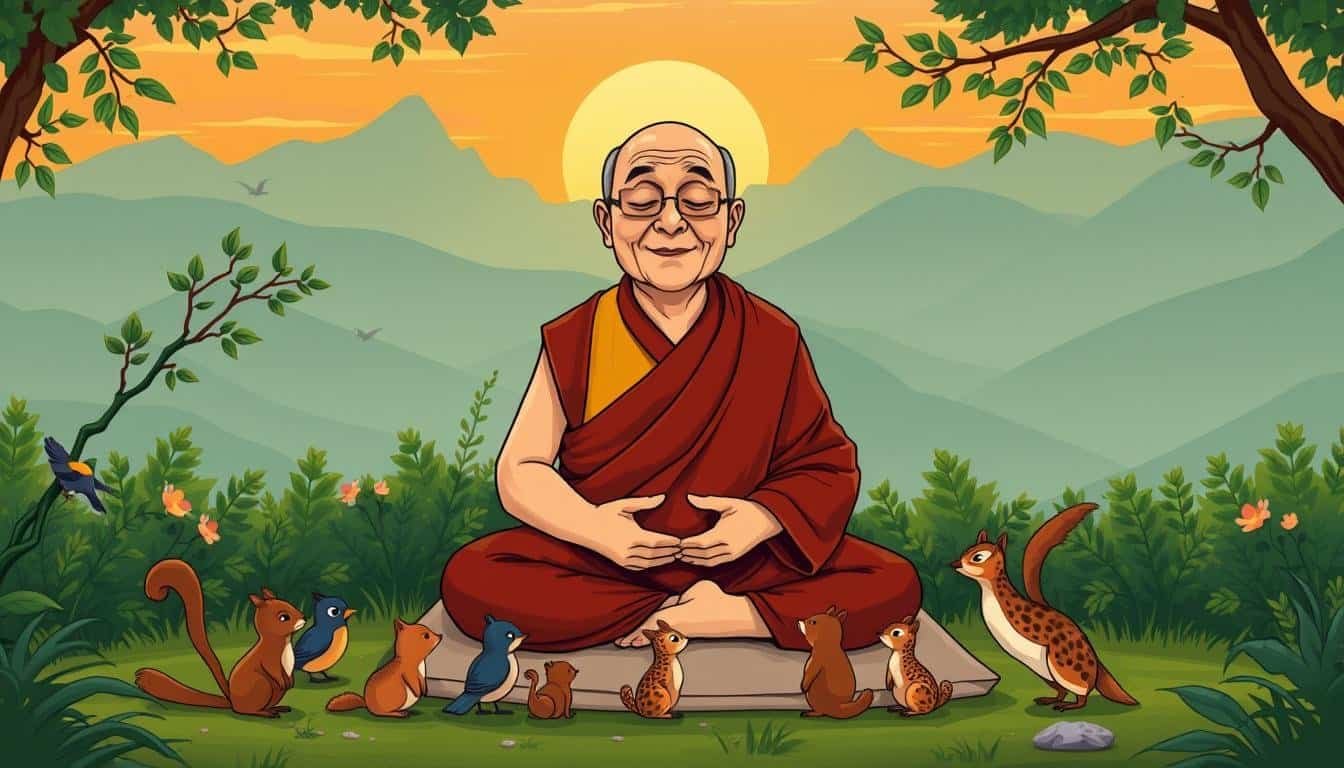Dalai Lama: Compassion and Mindfulness
“Love and compassion are necessities, not luxuries. Without them, humanity cannot survive.” This powerful quote from the Dalai Lama sets the tone for our exploration of compassion and mindfulness in Buddhist teachings.
The Dalai Lama, Tenzin Gyatso, is the spiritual leader of Tibetan Buddhism. His wisdom has touched millions worldwide. He teaches that inner peace and happiness are the true goals of life.
In today’s fast-paced world, stress and anxiety are at all-time highs. The Dalai Lama’s message of compassion offers a beacon of hope. He believes that mental peace has a greater impact on our lives than physical comfort.
The Dalai Lama’s teachings blend ancient wisdom with modern insights. He shows us how to cultivate love and compassion in our daily lives. These practices can lead to both personal growth and societal change.
As we dive deeper into the Dalai Lama’s teachings, we’ll discover how compassion and mindfulness can transform our lives. We’ll explore practical ways to apply these concepts and create a more peaceful world.
Introduction to the Dalai Lama’s Teachings
The Dalai Lama mixes Tibetan Buddhism with modern thoughts. This gives a fresh view on life and spirituality. His teachings cover ethics, human rights, and more, touching hearts around the world.
In the last ten years, 136 books have been written about the Dalai Lama. These books talk about compassion, mindfulness, and not using violence. Big publishers like Penguin Random House and HarperCollins share his ideas with everyone.
The Dalai Lama teaches that we’re all connected. He says being kind and respecting human rights is key for our own and others’ happiness.
“Our prime purpose in this life is to help others. And if you can’t help them, at least don’t hurt them.”
After getting the Nobel Peace Prize in 1989, the Dalai Lama kept pushing for peace and kindness. He talks about big issues like saving the planet and fighting for fairness. He mixes old Buddhist teachings with new science.
The Dalai Lama’s impact goes beyond just religious groups. In 1987, he started the Mind & Life Institute. This group connects science with meditation. It shows his effort to merge ancient wisdom with today’s knowledge.
The Purpose of Life According to the Dalai Lama
The Dalai Lama believes the main goal of life is to be happy. This idea comes from ancient Indian traditions and fits with what science knows about us today.
Happiness as the Ultimate Goal
We all deserve to be happy. Seeking happiness is key to living. It gives us hope and keeps us healthy.
True happiness comes from feeling good inside, not just from what we own.
Mental and Physical Well-being
The Dalai Lama says mental peace is more important than being physically comfortable. A peaceful mind helps us handle life’s ups and downs better. This peace is key to feeling good overall and can lessen physical pain.
The Role of Love and Compassion
Love and compassion are key to being happy and well. Showing care for others builds our confidence and strength. These qualities change our minds and bring real happiness.
| Factor | Impact on Happiness |
|---|---|
| Kindness | Basic source of happiness |
| Compassion | Builds inner strength and self-confidence |
| Mental Calmness | Crucial for overall well-being |
| Human Affection | Reduces fear, enhances brain function |
By living by these ideas, we can find peace and happiness inside. This makes life more meaningful, no matter what happens outside.
Understanding Interdependence in Buddhism
Buddhist philosophy teaches us about the deep connection between everything. This idea is key to feeling compassion and taking responsibility for others. The Dalai Lama uses nature and human society to show this.
In Buddhism, wisdom and compassion are like two wings of a bird. Without one, the bird can’t fly right. Wisdom helps us know our thoughts and feelings. Compassion comes from seeing we’re all connected. Together, they lead us to enlightenment and freedom.
Nature shows us how we work together. Insect colonies and humans both need each other to survive. This connection goes all the way down to the energy that moves everything, from stars to flowers.
“Actions driven by compassion and wisdom benefit everyone.” – Dalai Lama
Knowing we’re all connected makes us more compassionate. It shows our actions touch others. By mixing wisdom and compassion, we make the world better. This balance stops us from hurting others and helps everyone.
- Wisdom without compassion: lonely hermit in an ivory tower
- Compassion without wisdom: likeable fool
- Balance: key to personal growth and societal harmony
Being aware is the first step to change. Thinking about our actions keeps us balanced between wisdom and compassion. By seeing our connection to everyone, we build a kinder world based on Buddhist teachings.
The Power of Compassion in Leadership
Compassionate leadership is becoming a key part of making organizations better. The Dalai Lama teaches us about this approach. He shows how emotional smarts are key for leaders.
Compassionate Leadership Styles
The Dalai Lama talks about three ways to lead with compassion:
- The Trailblazer: Leads by example, inspiring others to follow
- The Ferryman: Guides and supports team members across challenges
- The Shepherd: Nurtures and protects the team, ensuring no one is left behind
These styles build trust and teamwork. They make the workplace more peaceful.
Creating a Better World Through Compassion
Compassionate leadership isn’t just for work. The Dalai Lama calls for a spiritual and ethical change. The COVID-19 pandemic showed us we need leaders who care for others more than themselves.
“True compassion is not just an emotional response but a firm commitment founded on reason.”
Overcoming Destructive Emotions
Being emotionally smart is key in compassionate leadership. Leaders can beat negative feelings like anger by being mindful and selfless. This helps them make better choices and build a positive work culture.
The ORPO (Openness, Resourcefulness, Persistence, Openness) model from “Conflict Without Casualties” shows how to use compassion in leadership. By following these principles, leaders can make their teams more caring and productive.
Mindfulness and Its Impact on Personal Growth
The Dalai Lama teaches that mindfulness greatly helps with personal growth. Mindfulness, including meditation, is key to knowing oneself and managing emotions. It keeps us in the moment, lowers stress, and brings peace.
At a big meeting with over 1,200 mental health experts, the Dalai Lama talked about mindfulness. He said it’s vital to understand our minds through meditation. A healthy mind attitude leads to peace and well-being.
“Staying in the present moment is key to peace and happiness.”
Studies show that loving-kindness mindfulness has many benefits:
- Increased positive feelings
- Less stress
- Better self-compassion
- More emotional support
Being kind to oneself is a big part of mindfulness. It helps fight depression. Experts say therapies that teach self-compassion help people with negative feelings.
Mindfulness also helps us be kind to others. Through meditation, we learn about our feelings and connect with others. This, as the Dalai Lama says, helps us grow and makes society more united.
Dalai Lama: Compassion and Mindfulness
The Dalai Lama teaches us about compassion and mindfulness. These teachings are key to finding peace and growing within ourselves every day.
The Connection Between Compassion and Mindfulness
Compassion and mindfulness go hand in hand in Buddhism. Studies show that meditation based on compassion can make us less self-focused and more connected. By being mindful every day, we notice others’ pain more and want to help them.
Practical Applications in Daily Life
Adding compassion and mindfulness to our daily life changes everything. Begin your day with a kind thought. Stay in the moment during conversations. The Healthy Minds Program app offers free tools that mix old wisdom with new science.
Cultivating Inner Peace Through These Practices
Meditation is crucial for staying focused and clearing our minds. Start with short five-minute sessions and slowly add more time. Sticking with it can make us happier and bring us closer to peace within.
| Practice | Benefits | Recommended Duration |
|---|---|---|
| Compassion Meditation | Increases positive affect, decreases negative affect | 15-30 minutes daily |
| Loving-Kindness Meditation | Cultivates empathy, reduces stress | 10-20 minutes daily |
| Tonglen Meditation | Develops compassion, alleviates suffering | 5-15 minutes daily |
By using these Buddhist practices, we can grow in compassion and mindfulness. This leads to a deeper peace that lasts.
The Importance of Human Affection and Connection
The Dalai Lama’s teachings show how key human relationships are in our lives. From the start, we need love and affection to grow well. This need for connection shapes our happiness and well-being as we age.
Studies reveal that kids who get lots of love from parents and friends are happier. This early care helps them make strong emotional bonds later. Even toddlers feel happy when they see others being kind and helping each other, showing we’re naturally caring.
Our need for emotional connection doesn’t end in childhood. Adults who care for others often feel more fulfilled and peaceful. This caring approach boosts our confidence and courage, improving our mental health. On the other hand, focusing only on ourselves can lead to feeling anxious, lonely, and angry.
“Caring about others’ well-being is the best way to achieve one’s own happiness and health.”
The Dalai Lama believes our happiness, comfort, and even fame depend on our connections with others. We need others for basic things like food and shelter, and for deeper desires like security and recognition. Valuing these bonds helps us build a kinder world and find true happiness.
- Human affection is crucial for physical and mental growth
- Caring for others leads to greater inner strength and calm
- Social connections impact our happiness at all life stages
By understanding the value of human affection and our social bonds, we can create a more united society. This leads to true contentment in our lives.
Developing a Warm Heart and Clear Mind
The Dalai Lama teaches us how to balance our minds and hearts. He reaches millions through video conferences, sharing his message of compassion. He believes all religions aim to make us kinder, focusing on being moral and peaceful.
Balancing Intelligence and Emotional Well-being
Feeling smart and feeling good emotionally are both important for growing as a person. The Dalai Lama says faith helps us reach a higher state, but reason is key to true freedom. Finding this balance helps us keep our hearts warm and our minds clear, making life easier to handle.
The Role of Education in Fostering Compassion
Learning with kindness is crucial for a healthy society. The Dalai Lama believes education should teach us right from wrong and how to be kind. Adding mindfulness, like meditation, to schools helps students manage their feelings and stay strong.
Overcoming Societal Challenges Through Mindfulness
Mindfulness is a strong way to tackle big problems. It has been shown to lessen anxiety and improve mood. With 54% of Chinese people feeling stressed during the pandemic, and ongoing health gaps, mindfulness can bring us together. It helps us understand and support each other, making the world a better place.
Source Links
- Compassion and the Individual | The 14th Dalai Lama
- Why Leaders Should Be Mindful, Selfless, and Compassionate | The 14th Dalai Lama
- Living the Compassionate Life | Lion’s Roar
- Books | The 14th Dalai Lama
- The Best of the Dalai Lama: Life, Quotes, Teachings, and Books | Lion’s Roar
- The purpose of life is to be happy | The 14th Dalai Lama
- Compassion as the Source of Happiness | The 14th Dalai Lama
- Ep. 175: The Two Wings of Freedom – Wisdom and Compassion
- Celebrating Our Interdependence – Still Water Mindfulness Practice Center
- The Dalai Lama: Leadership and the Power of Compassion (Paperback)
- What Does The Dalai Lama Know About Compassionate Leadership? – Next Element
- The Dalai Lama: Leadership and the Power of Compassion NEW HARDCOVER PREORDER 9781623718145 | eBay
- Mindfulness in Everyday Life: My Day With the Dalai Lama — A Primer for Happiness
- Loving-Kindness Mindfulness Practice: Instructions for the Heart
- What is Compassion Meditation? (+ Mantras and Scripts)
- The Dalai Lama’s Guide to Happiness available through the Healthy Minds app – Healthy Minds Innovations
- Compassion, Mindfulness and Resilience – Pittsburgh Quarterly
- The Ultimate Happiness: An exclusive interview with the Dalai Lama | Lion’s Roar
- Training the Mind: Verse 1 | The 14th Dalai Lama
- Travis Hellstrom’s 600+ Quotes from The Dalai Lama
- Mind & Life Conversation: Resilience, Compassion, & Science for… | The 14th Dalai Lama
- Loving-Kindness and Compassion Meditation: Potential for Psychological Interventions







